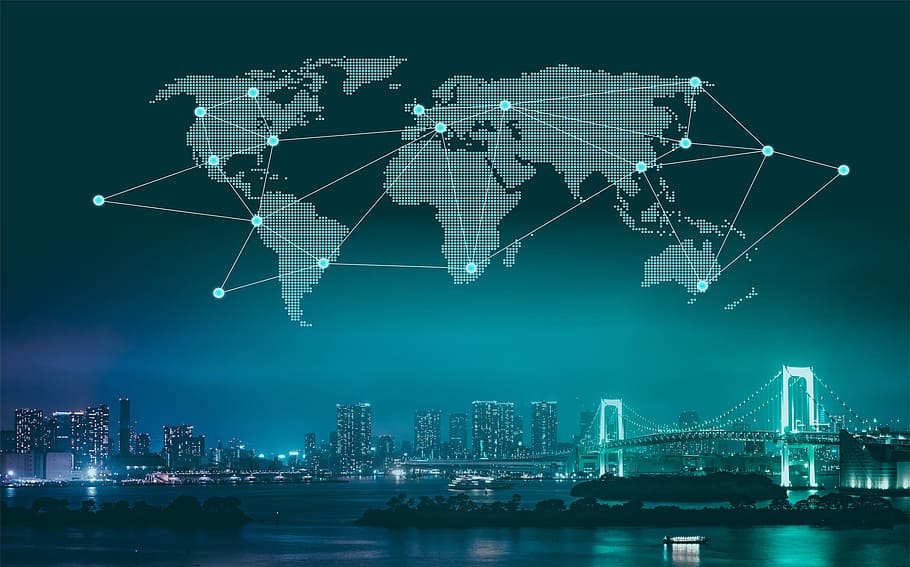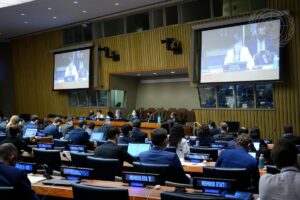Q: With global trade expected to fall this year to levels at least as low as during the years of the financial crisis, some are predicting gloomy forecasts for globalization. What are your thoughts about the future of globalization in a post-pandemic world?
Throughout human history, globalization(s) have been characterized by increased trade and travel, and infectious diseases have hitched rides on people, commodities, and modes of transport across continents. This pandemic is the latest manifestation of that trend, though it has been boosted by the pursuit of ever faster and “freer” trade and travel among high density population centers. Yet, as in the past, globalization survived initial public backlash, populism, and protectionism. This time, too, one can expect that the need to cooperate and coordinate responses to the pandemic and to shore up national and regional economies will eventually soften the hard anti-globalization rhetoric and policies.
One must, however, remember that populism and protectionism have been a product of globalization, which produces winners and losers in every economy. Those who have benefitted from the current phase of globalization are on notice: those who have not benefitted or have lost are growing in number and are not willing to wait for benefits to trickle down. Pandemic has intensified these trends by providing visible and undeniable proof to anti-globalization groups that dense linkages with the outside world cause not just economic but also health problems, which, in turn, have taken away their ability to work even in low-paying jobs.
But globalization is not going away. Growing populations around the world have to be fed, clothed, and housed, and insular economic systems will not be up to the challenge. In the developed and emerging market economies, consumers have continually growing expectations about the availability of goods and services at “reasonable” prices. In the developing world, images of life in developed economies have created expectations that such lifestyles should be made possible at home or can be accessible if one migrates. None of these expectations can be fulfilled either via prolonged protectionist measures, or abnegation of capitalism and free trade — the two drivers of globalization. But the next phase of globalization will be marked by some restrictions on unfettered capitalism and trade, thus far based largely on profits and ROIs. Businesses will have to re-orient their supply chains based on how governments recategorize friends and foes in different regions and “disabuse” their shareholders of unrealistic growth expectations.
Q: Foreign Direct Investment is also expected to incur a severe decline this year. What impacts do you expect because of this?
According to UNCTAD’s World Investment Report 2020, global foreign direct investment (FDI) flows are forecasted to decrease by up to 40% in 2020 from their 2019 value of $1.54 trillion, and projected to decrease by a further 5–10% in 2021 and to initiate a recovery in 2022. Developing economies that rely on extractive industries or tourism will be the hardest hit, with stoppage in production now and falling demand in the months ahead. Transition economies will face the prospect of no new investments and reductions in cross-border mergers and acquisitions in the near to mid-term. But as the global economy recovers in late 2021, investors will look for re orientation of value chains that are more resilient. This might mean divestment in some countries or sectors and new or renewed investment in the more promising sectors. We might even see competition amongst Western and Chinese investors in some countries that both assess as profitable.
There will also be a parallel trend where more countries may institute restrictions on foreign investment in certain sectors, mostly based on national security concerns. Health, IT, and telecommunications sectors are most likely to be the focus of such restrictions. While most of such restrictions will not target any particular investment-source in policy documents, it is highly likely that the scrutiny will single out investments from specific countries of concern to the recipient country. In the United States, Canada, India, South Africa, Australia, and parts of the EU, such scrutiny will be focused on investments from China and Russia, and possibly from some political allies with dubious records on terrorism, proliferation financing, and money laundering. In other countries in the Global South, these restrictive policies might just be a means to keep certain sectors of the economy reserved for nationalized enterprises or monopoly companies owned by the political elite or to allow for better bargains from the investors. Regardless of the motivation, the legal restrictions on FDI are likely to grow in the post-pandemic world.
Q: Some countries are exhibiting nationalist trade policies by restricting exports, with talk about contracting supply chains within a country and/or regionally. By doing so, what implications and challenges would you foresee?
We are likely to see globalization with a few new characteristics: more focus on intra-regional trade, relatively shorter supply chains for some products, and more state-directed and supported production and procurement of some commodities that are identified as crucial for either health security or national security.
Even before the pandemic, another pattern had become visible and explains much of the protectionist rhetoric during this time. In the developed economies, most of the high-paying jobs are technical or technology-related. At the other end are the far more numerous but low-paying service sector jobs. This model has squeezed out middle income jobs and hollowed out manufacturing capability for day-to-day items. To the extent that manufacturing capability exists, robots and machines are likely to replace humans — to increase productivity and reduce costs — because machines do not need to be paid social security, health insurance, pension, or paid leave, and do not require as much effort in training/re-training about production processes or management mandates. Humans needed for maintenance of such machines will be fewer in number and would have to be technologically savvy. But machines do not vote. Politicians and policymakers have to respond to the concerns of this “middle” class. The initial “nationalist” responses have already begun to converge around calls for domestic production of
some basic items. The demand has always been there, but the pandemic has provided a platform for piggy-backing long-standing and real grievances.
The challenge to domestic production, however, will be two-fold. First, manufacturing still remains an environmentally dirty business and will require lowering of standards. “Clean” manufacturing of most goods is still not going to be clean enough. At the same time, mechanisms will be needed to prevent a race to the bottom on this issue. Second, for production to be sustainable at home, large initial subsidies may be necessary, along with lower-than-expected wages, in order to compete with the alternate manufacturing locations in the developing world.
Consumers, too, will have to be prepared for higher prices. And all of these changes will need electoral blessing. Politicians, therefore, will have to develop platforms that explain what sacrifices will need to be made to achieve this “post-pandemic” economy. The last, I believe, will be the hardest to undertake in democracies, because there are very few examples of “power speaking truth” to the powerless.
Q: What scenarios may developing nations face with declines in international trade?
Decline in international trade due to the pandemic will cause major economic pain for the next few years. However, developing nations had begun to face the challenges of rising expectations and growing gaps between the rich and the poor even before the pandemic. A major consequence of the pandemic-induced economic loss, combined with more aggressive Chinese actions in Asia and Africa, is the emergence of a focal point for blame: anti-China sentiment across much of the
developing world. There are growing calls to boycott Chinese goods, increased public criticisms of their governments for allowing unfettered Chinese investments in the country, and critical analyses of the economic and social consequences of Belt and Road investments. Governments are facing growing clamor that they need to distance national economies from China, and wherever possible, offer themselves as alternative sites for manufacturing and services for the Western markets. If Western companies intensify their efforts to lessen their dependence on China, many developing countries may benefit from such re-shaping of the global value chains in the medium- to long-term in the post-pandemic world.
These countries may see their production capability grow, at the expense of China, as Western and East Asian companies re-orient their supply chains. While the developed economies settle their own domestic debates about the kinds of commodities that are better produced at home, and what sacrifices would be politically and environmentally acceptable in order to do so, developing economies will see more interest and investment from Western (U.S., U.K., Canada, Australia, E.U.) and Eastern (Japan, India, South Korea) industry. The developing countries,
however, will need to augment their own capacity to absorb this demand while maintaining a cordial economic relationship with China, until the changed trade orientation of Western economies solidifies.
Q: What policies or actions would you prescribe to invigorate international trade, post-pandemic?
Approximately $10 trillion support from central banks, mostly in the developed economies, has helped to sustain the global economy against the worst impacts of the pandemic thus far, avoiding an endless free fall. However, developing countries cannot find their way back into the global value chains unless they can manage the health risks to their populations and reassure their overseas customers.
The first order of priority for the international community, which is currently focused on economic recovery and re-invigorating international trade, should be to provide assistance to developing countries on healthcare — not just in the distribution of vaccines (whenever they become available), but shoring up basic healthcare infrastructure that allows for COVID-19 tracking, testing, and treatments, and medicines for non-COVID-19 conditions that make populations vulnerable to COVID-19. This need not be conceived as charity projects. Developing countries can provide immense amounts of data on the characteristics of the virus (e.g., genetics, replication, co-morbidities, and transmission pathways). Their best scientific brains and low-cost manufacturing capacities can be harnessed for developing response strategies, including vaccines and treatments that are globally useful.
Second, policies that lessen the impact of rising debt in developing economies would be needed to shore up political stability, rather than the usual prescriptive belt-tightening measures. No amount of temporary debt-service suspension, for example, will help if the target countries
descend into political chaos and allow extremist anti-trade ideologues to come to power. Third, to the extent possible, domestic producers and foreign investors should be incentivized to invest in digital technologies The Pandemic’s Squeeze on International Trade and IT infrastructure in both developed and developing economies to enable remote working for certain segments of the workforce that would reduce large concentrations of persons, ultimately minimizing the spread of this and subsequent viruses.
– Interview by Alexandra Gilliard
Read the full International Affairs Forum July 2020 report, The Post-Pandemic World.



